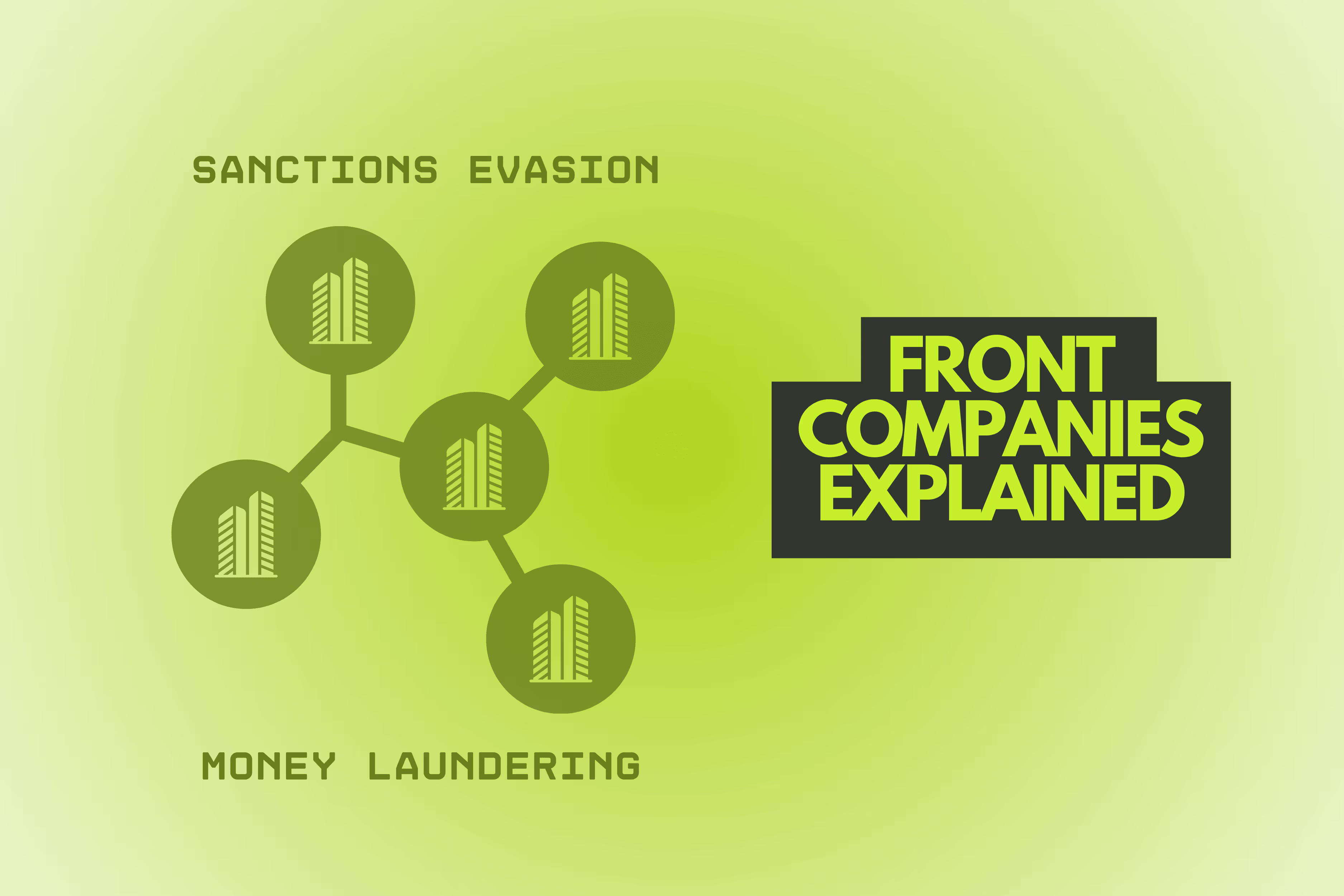
What Is a Front Company? A Tool Money Launderers Exploit
A front company is a business that often hides its true function from law enforcement, possibly because of money laundering and sanctions evasion activities. With real-world examples, this article explains how they work and why they may pose a high risk for your business.
What Is a Front Company?
A front company is essentially a facade. It can be a business with minimal activities, or the activities it does have are masking what's really going on.
Often, front companies are confused with shell companies. The major difference is this: Shell companies are usually just legal entities on paper alone. They may not even have a physical office, with lawyers or third-party services managing their affairs and acting as a mailing address (as the Pandora Papers revealed in great detail).
Front companies, on the other hand, may have a physical office, they may have employees, and they may also offer goods and services - this is what creates the facade.
In money laundering, the classic stereotypes of front companies include businesses such as car washes, laundromats, hair salons, casinos, and many more - you get the gist.
However, if you dig deeper, the clandestine world of front companies is far more than criminal groups laundering their cash-based illicit proceeds. Front companies may also have ties to state-owned companies from heavily sanctioned countries. And it gets more worrying when the trail leads directly to intelligence agencies and military wings (more about that later in the article).
Recommended reading from the blog: What Is a Shell Company?
What Are Front Companies in Money Laundering and Sanctions Evasion?
Front Companies: Money Laundering
Criminals use front companies to launder money. But how? A process that usually occurs in the placement stage of money laundering, illicit cash proceeds from organized crime such as drug trafficking, human trafficking, and fraud are funneled through the legitimate revenue of a front company.
The systematic mixing of the funds, which are then deposited into bank accounts (to begin the layering stage), makes detection challenging for financial crime fighters and law enforcement.
Front Companies: Sanctions Evasion
We are now living in an era of expanding sanctioned laws with countries such as Russia, the most heavily sanctioned country in the world, constantly seeking techniques to evade sanctions and continue trading.
It's a tremendous challenge for jurisdictions imposing sanctions (such as the EU, the US, and the UK) to keep up.
So, how do sanctions evaders utilize front companies to get around sanctions? Here are some of the common steps:
- Establish parent companies in jurisdictions not subject to sanctions
- Create further companies under the parent company
- Conceal the ownership of companies through complex structures
- Route payments and trade through the front companies
In addition, sanctions evasion typologies such as false invoicing and fraudulent documents are used to further murky the trail.
Real-World Examples of Front Companies In Money Laundering and Sanctions Evasion
Numerous high-profile cases of money laundering and sanctions evasion involving front companies have occurred. Let's now look at two infamous examples.
Front Company Money Laundering (Cali Drug Cartel)
There are countless real-life instances of money laundering taking place through front companies. Perhaps that's why when TV shows, such as Breaking Bad, or movies like The Laundromat, portray money laundering activities, they often depict front companies as a common tactic criminals use.
But let's zone in on one of the most infamous front company money laundering networks ever to have existed.
The Cali Cartel was a drug cartel based around the Colombian city of Cali and the Valle del Cauca. Founded in 1977, they eventually went on to control 80% of the world's cocaine market.
In 2003, the US Treasury's Office of Foreign Assets Control (OFAC) sanctioned 39 businesses acting as front companies for the Cali Cartel in jurisdictions including the United States.
In this high-profile case, the front companies weren't car washes or laundromats. The Cali Cartel's favored front company type was, ironically, drugstore chains selling legal products.
Recommended reading from the blog: Exploring Revealing Movies and Netflix Hits That Expose the Secrets of Money Laundering
Front Company Sanctions Evasion (Iran)
For this real-world example, we do not have to rewind the clock far. In February 2024, the Financial Times reported that Iran used two leading UK banks to covertly shift money around the globe as part of a sanctions evasion scheme backed by Tehran's intelligence services.
The banks in the crosshairs, Lloyds and Santander UK, allegedly provided accounts to UK-registered front companies that are, according to the report, secretly owned by Iran's state-controlled Petrochemical Commercial Company (PCC).
Adding intrigue and complexity to the case, the FT reported that PCC UK (the UK arm of the company) was also part of a network that the US accuses of raising millions of dollars for the Iranian Revolutionary Guards Quds Force.
Types of Schemes Used to Evade Sanctions Through Front Companies
To finish this article, here's an infographic that sanctions.io shared on our LinkedIn page, exploring how front companies are used to evade sanctions.
As revealed in the graphic below, here are the most common methods:
- Concealment of Beneficial Ownership
- Dual-Use Goods Procurement
- False Documentation
- Trade-Based Money Laundering

If you liked this infographic, please feel free to follow sanctions.io's LinkedIn page to see more.
Final Thoughts and How sanctions.io Can Help
Government regulators in jurisdictions such as the EU, the US, and the UK require companies to follow sanctions laws to help prevent money laundering and sanctions evasion, for example, occurring through front companies.
Screening business partners - such as customers and vendors - is a crucial process that helps mitigate the risk of being non-compliant. sanctions.io is a highly reliable and cost-effective solution for AML and sanctions screening. AI-powered and with an enterprise-grade API with 99.99% uptime are reasons why customers globally trust us with their sanctions screening needs.
To learn more: Book a free Discovery Call.
We also encourage you to take advantage of our free 7-day trial (no credit card is required).



